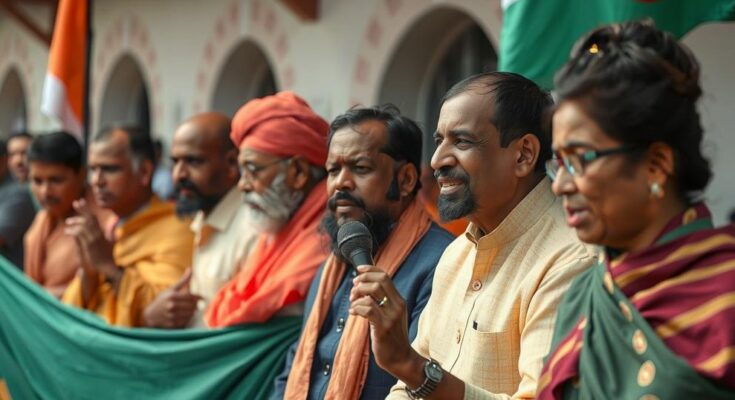A group of expatriate Bangladeshi Hindus is urging India to pursue UN sanctions against Bangladesh to protect minority rights amid rising persecution of Hindus. They presented a five-point plan, calling for global intervention and the establishment of protected zones. Their demands highlight ongoing tensions following the political upheaval in Bangladesh and concerns over the dwindling Hindu population in the region.
A group of expatriate Bangladeshi Hindus, affiliated with the Global Bengali Hindu Coalition and based primarily in Europe and North America, has urged the Indian government to seek United Nations (UN) sanctions against Bangladesh. This plea is made in light of what the group describes as increasing persecution faced by Hindus and other religious minorities following the recent political changes in Bangladesh, particularly since the ouster of Sheikh Hasina in August. They claim that this adverse environment necessitates international intervention to safeguard these communities.
The representatives of this group convened a press conference in New Delhi, where they presented a five-point plan for action. Key demands included calling for global intervention, deploying UN peacekeeping forces to protect minorities, and issuing targeted sanctions against the current Bangladeshi government due to its alleged human rights violations. They also propose to “complete the unfinished population exchange from the 1947 Partition,” which they believe would facilitate the resettlement of displaced minorities in Bangladesh.
Furthermore, the group has requested that the Indian government advocate for the establishment of protected zones in Hindu-majority regions of Bangladesh and reassess Bangladesh’s contributions to UN peacekeeping efforts. These demands stem from a deep concern for the safety of Hindus, who, according to Sitangshu Guha, the leader of the group based in the US, require protection from potential extinction, stating, “India is our best friend, it can help rescue the 20 million Hindus of Bangladesh.”
Recent interactions between the Indian government and the Bangladeshi interim administration have highlighted ongoing tensions regarding the treatment of minorities. Reports of targeted attacks against Hindu properties, including temples and homes, have surged, particularly after Sheikh Hasina’s administration faced protests and political instability. Despite the interim government’s claims of exaggerated reports, accounts from Guha and other group members indicate that assaults on Hindus have persisted under both the Hasina government and the current administration.
Specific incidents have been documented, revealing an alarming trend of violence against Hindu communities. For instance, a report cited 51 attacks on Hindu temples and related sites between August and December, illustrating the precarious position of the Hindu minority in Bangladesh. Arun Dutta, a member residing in Canada, expressed profound concern about the dwindling Hindu population, which has plummeted from 22% in 1951 to approximately 8% in 2022, advocating for the protection of this community’s interests since 1947.
The plight of Hindus and other religious minorities in Bangladesh has become a pressing issue, especially following political upheavals such as the recent departure of Sheikh Hasina’s government. The Global Bengali Hindu Coalition, consisting predominantly of expatriates from Bangladesh, has taken an active stance in seeking international support to address these concerns. Their call for intervention from India and the United Nations seeks to address alleged systematic discrimination and violence against minority groups, highlighting a historical context of declining Hindu populations in the region since independence.
In summary, the expatriate Bangladeshi Hindu group’s appeal to the Indian government for UN sanctions against Bangladesh highlights critical concerns over the treatment of religious minorities in the country. With a focus on international intervention and targeted actions to safeguard the Hindu community, the group’s demands reflect a desperate plea for support amidst a climate of rising persecution. The ongoing tensions in India-Bangladesh relations further complicate this pressing issue, necessitating continued advocacy for minority rights.
Original Source: www.hindustantimes.com




